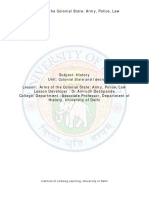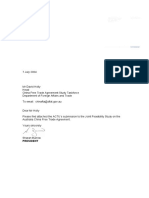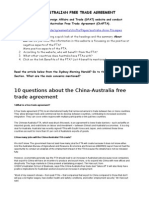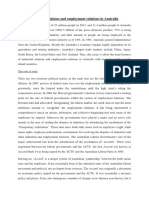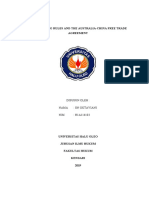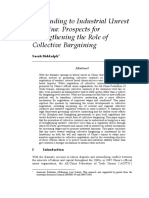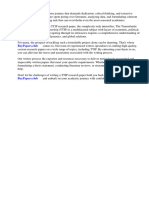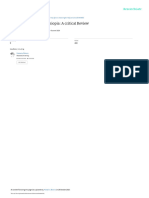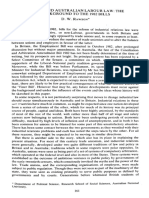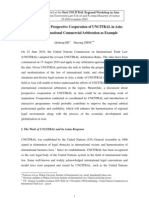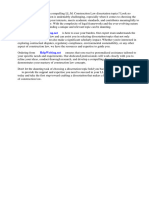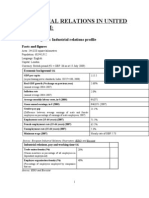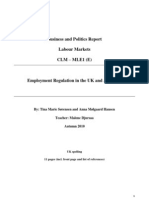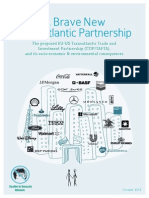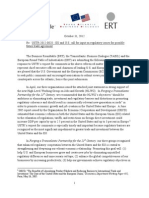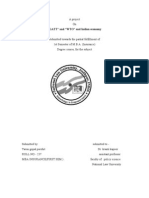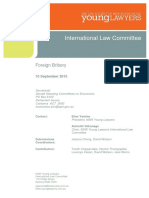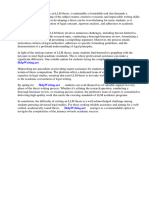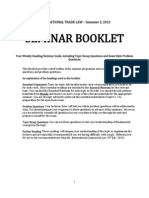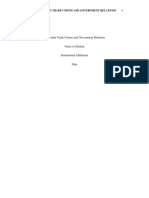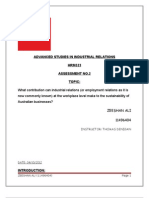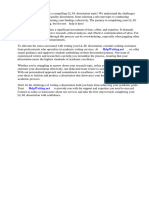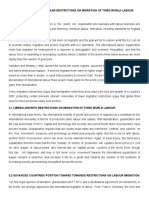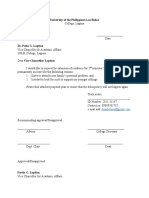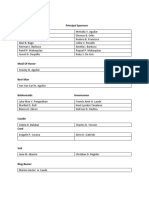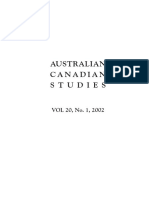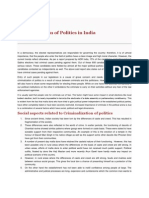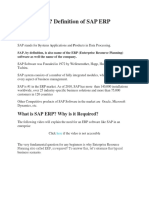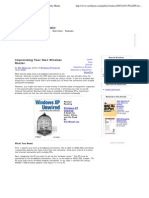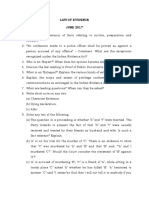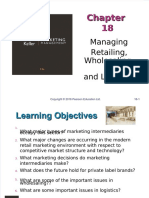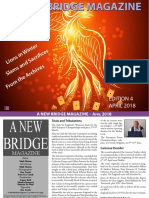Professional Documents
Culture Documents
Free Trade Example
Free Trade Example
Uploaded by
Dean BolimaOriginal Description:
Copyright
Available Formats
Share this document
Did you find this document useful?
Is this content inappropriate?
Report this DocumentCopyright:
Available Formats
Free Trade Example
Free Trade Example
Uploaded by
Dean BolimaCopyright:
Available Formats
Mr Losley Heckler
Head
Agreement Study Taskforce
Department of Trade
To email: junfer@gmail.com
Dear Mr Heckler
Please find attached the ACTU’s submission to the Joint Feasibility Study on the
Australia China Free Trade Agreement.
Yours sincerely
Sharan Burrow
PRESIDENT
ACTU Submission to DFAT Study Taskforce 1
30 June 2004
FREE TRADE AGREEMENT JOINT
FEASIBILITY STUDY
ACTU Submission
To DFAT Study Taskforce
30 June 2004
30 June 2004
ACTU Submission to DFAT Study Taskforce 2
30 June 2004
Introduction
The Australian Council of Trade Unions [ACTU] is Australia’s peak union
organisation. All major unions in Australia representing almost 2 million
working women and men are affiliated to the ACTU.
The ACTU is affiliated with several international union organisations and
represents Australian organised labour at the International Labour
Organisation [ILO]. Our position and submissions on issues relating to
international trade negotiations and agreements reflect our solidarity with
working people worldwide.
In general the ACTU believes multilateral arrangements are preferable to
bilateral arrangements. We reject the view that unilateral free trade is optimal.
Moreover, we do not support free trade agreements in the abstract or for their
own sake. Our support for trade agreements is rather directed to improving
the human condition; accordingly free trade agreements must provide for
trade to be fair for all parties involved.
Market Economy Status
Since the late eighties the Chinese economy has undergone significant
restructuring based on certain ‘market economy’ precepts.
This restructuring has not been accompanied by increased openness in
Chinese society.
Without social openness and respect for basic human rights, an essential
element of a free market economy is missing.
In short, China has had much economic perestroika but little social or political
glasnost.
Chinese working people have no effective right to organise.
The All China Federation of Trade Unions [ACFTU] is the sole union
federation in China. It is sanctioned by the government, and is officially and
legally subservient to the policies of the government and the communist party.
The ACFTU is not independent. Nor is it a true trade union. Independent
trade unions are outlawed, and any strikes are rapidly repressed.
While workers’ protections exist on paper local authorities rarely enforce
them. Freedom of association is a fiction, and repression of workers’ rights is
a systematic part of state policy [ref www.ICFTU.org ]
Imprisonment of unionists for ‘illegal demonstrations’ is well documented.
[Ref ICFTU Annual Survey of Violations of Trade Union Rights, 2003]
ACTU Submission to DFAT Study Taskforce 3
30 June 2004
China has never ratified ILO conventions 87 and 98, which provide for the
right to organise and bargain collectively.
The suppression of workers’ rights and failure by China to enforce its own
minimum labour code has been estimated by the AFL-CIO to have cut the
price of Chinese labour by between 47% and 86%. [Ref www.aflcio.org ]
A first-hand window on these issues is available from the experience of the
Maritime Union of Australia [MUA] and the Global Union Federation ITF to
which the MUA is affiliated. The MUA and ITF have some understanding of
dealing with the China through the Flag of Convenience [FOC] Shipping
campaign and highlight the following concerns which should be considered in
the context of a FTA feasibility study.
The international campaign against flag of convenience has focused on a
perceived threat of Chinese seafarers’ becoming the lowest paid group of
workers in the world prepared to sail on the world’s FOC fleet as well as the
large Chinese national line ships, COSCO.
There are tens of thousands of workers now trained and gradually replacing
workers from traditional labour countries, like Filipino seafarers, on the FOC
fleet. It is extremely difficult to communicate with these workers because their
employment conditions and rates of wages are considered national secrets
and to divulge this information to anyone including the ITF is regarded as an
act of treason. In many cases and on many routes COSCO still employ a
political commissar on board to protect the interests of the Chinese
government.
The ITF has evidence suggesting that Chinese seafarer ratings are paid less
than three dollars a day and a little more for officers. Even when the ship is
covered by an ITF agreement there is little that can be done by the ITF to
police the higher level of wages and even less to confirm that any of the
seafarers concerned really receive the correct (agreement) rate.
The ACTU considers it would be wholly inappropriate to accord China status
as a full market economy in such circumstances.
These reservations are magnified by several additional critical considerations.
The secretive nature of Chinese society and suppression of political dissent
makes it difficult to quantify the true extent of these considerations, but reports
are sufficiently authoritative and frequent to establish the existence of a
substantial and continuing violation of market economy precepts. [Refer
submission to this Inquiry by Chris Nyland and Anne O’Rourke.]
First, China’s ‘Laogai’ is an extensive prison system with estimates of the
number of inmates ranging from 10 to 20 million. The Laogai system
incorporates the view that state criminals must be stripped of their exploiter
ideology and taught to work like members of the proletariat. Accordingly
inmates are required to work during their incarceration with food rationed
according to personal output [The New Internationalist 2001].
ACTU Submission to DFAT Study Taskforce 4
30 June 2004
The Laogai are operated as businesses and seek to recoup most of their
costs in sales of goods. Prison output in contemporary China is substantially
consumer goods, and finds its way to export markets.
Second, child labour is common and widespread in the manufacture of
fireworks, textiles and toys.
Third, the country’s own occupational health and safety standards are not
enforced, resulting in appalling working conditions and atrocious records of
work related accidents and disease.
Fourth, failure by China to establish and/or enforce effective environmental
laws and standards delivers an unfair competitive advantage to Chinese
industry.
The ACTU considers it would be utterly retrograde and against Australia’s
national interest to proceed with a free trade agreement with China in the face
of these substantial concerns.
This is heightened by concerns related to the capacity of Australian
governments to pursue effective industry development policies under the
provisions of certain FTAs. By way of illustration an FTA should focus on the
inclusion of the maritime industry in Australia not only for the employment of
seagoing workers but also in the development of shipbuilding and associated
domestic industries.
The recent gas deal signed by Howard for $28Billion gave absolutely no
consideration to Australia to provide hardware or workers for the delivery of
essential gas supplies from the Australian fields. Our information is that this
requirement will double in 7 years.
The delivery of LNG from the W.A. North West gas fields is a clear example of
how the Australian unions and industries can be included with Australian
ships and crews being tasked with one third of the transport requirements with
an unblemished record of industrial cooperation.
Alternatives to a China-Australia FTA
The ACTU understands many Australian firms to hold grave misgivings about
investment in China, because of the absence of effective and transparent
enforcement mechanisms under the Chinese legal code. These misgivings
are most pronounced with administrative arrangements in the non-coastal
precincts of the country.
Such concerns can be, and have been addressed in other contexts, by means
of bi-lateral investment agreements explicitly incorporating specific and
ACTU Submission to DFAT Study Taskforce 5
30 June 2004
agreed disputes settlement procedures. A full FTA is not necessary for such
concerns to be met.
The Australia – China Trading Relationship
In October 2003 Australia and China signed a Trade and Economic
Framework agreement. Paragraph one of that agreement states:
``By means of all-round economic and trade co-operation, the
parties will co-operate to achieve balanced and comprehensive
trade and investment facilitation and liberalisation.''
(Source: Trade and Economic Framework between Australia and the People's
Republic of China accessed via DFAT web site).
Getting more balance within the Australia-China trading relationship would be
a most welcome development.
Table One below shows that the current trading relationship is almost solely
based on Australia exporting largely unprocessed commodities and importing
manufactures. Greater balance in the trading relationship would involve
substantial increases in Australia's exports of elaborately transformed
manufactures (ETM's) to China.
ACTU Submission to DFAT Study Taskforce 6
30 June 2004
ACTU Submission to DFAT Study Taskforce 7
30 June 2004
You might also like
- Comrades in conflict: Labour, the trade unions and 1969's <i>In Place of Strife</i>From EverandComrades in conflict: Labour, the trade unions and 1969's <i>In Place of Strife</i>No ratings yet
- 3.1 Arms of The Colonial State Army, Police and LawDocument24 pages3.1 Arms of The Colonial State Army, Police and Lawdeeksha vermaNo ratings yet
- The FascismDocument7 pagesThe FascismJasmuneNo ratings yet
- 062 - Complete Electronically - AARTO07Document2 pages062 - Complete Electronically - AARTO07Herm69No ratings yet
- Feasibility Study Example 06Document15 pagesFeasibility Study Example 06yassine Ben Kara AhmedNo ratings yet
- 10 Questions About The China-Australia Free Trade AgreementDocument4 pages10 Questions About The China-Australia Free Trade AgreementKaliNo ratings yet
- 146 - China-Australia Free Trade AgreementDocument40 pages146 - China-Australia Free Trade AgreementJustinNo ratings yet
- Business School: Assignment 1: Trimester 1, 2009Document14 pagesBusiness School: Assignment 1: Trimester 1, 2009manjith7162No ratings yet
- MG 316 - Assigment 1Document9 pagesMG 316 - Assigment 1Regional SwamyNo ratings yet
- EScholarship UC Item 98v0c0jjDocument35 pagesEScholarship UC Item 98v0c0jjvoltzNo ratings yet
- Anti-Dumping Rules and The Australia-China Free Trade AgreementDocument6 pagesAnti-Dumping Rules and The Australia-China Free Trade AgreementILo CHila'asZe SLayersNo ratings yet
- The Impact of The China-Australia Fair Trade AgreementDocument20 pagesThe Impact of The China-Australia Fair Trade AgreementUniversity of AdelaideNo ratings yet
- China BriefingDocument12 pagesChina BriefingerlanggantengNo ratings yet
- Emily Reid - Regulatory Autonomy in The EU and WTO - Defining and Defending Its LimitsDocument25 pagesEmily Reid - Regulatory Autonomy in The EU and WTO - Defining and Defending Its LimitsMieras HandicraftsNo ratings yet
- SLRV 34 No 1 BiddulphDocument29 pagesSLRV 34 No 1 Biddulphj yennebNo ratings yet
- Anti-Monopoly Law of ChinaDocument6 pagesAnti-Monopoly Law of ChinagiantchengcnNo ratings yet
- Ttip Research PaperDocument5 pagesTtip Research Papergvzraeg5100% (1)
- Traderemedylawsin EthiopiahabtamulanjoreDocument8 pagesTraderemedylawsin Ethiopiahabtamulanjorebehailu bekeleNo ratings yet
- 30 - Civil Liberties AustraliaDocument7 pages30 - Civil Liberties AustraliaJustinNo ratings yet
- Fta ThesisDocument9 pagesFta ThesisJim Jimenez100% (2)
- 1 PB PDFDocument12 pages1 PB PDFtitusNo ratings yet
- Controversies in Trade PolicyDocument13 pagesControversies in Trade PolicyAnkur Thakkar100% (1)
- British and Australian Labour AlwDocument21 pagesBritish and Australian Labour Alwpooja sainiNo ratings yet
- Thailand Tuna - DSB Case StudyDocument8 pagesThailand Tuna - DSB Case StudyTHE_ATGNo ratings yet
- The Efforts and Prospective Cooperation of UNCITRAL in Asia: Taking International Commercial Arbitration As ExampleDocument13 pagesThe Efforts and Prospective Cooperation of UNCITRAL in Asia: Taking International Commercial Arbitration As ExampleDiana HogasNo ratings yet
- Arnel Sanchez Paper PDFDocument98 pagesArnel Sanchez Paper PDFevgciikNo ratings yet
- Wto Research Paper TopicsDocument6 pagesWto Research Paper Topicsepfdnzznd100% (1)
- South Korea's Export Control SystemDocument20 pagesSouth Korea's Export Control SystemStockholm International Peace Research InstituteNo ratings yet
- Phungula Noluthando 2013-40-70Document31 pagesPhungula Noluthando 2013-40-70Andres Felipe Rodriguez QuirogaNo ratings yet
- China's Antimonopoly Law 2008: An Overview: Allan FelsDocument24 pagesChina's Antimonopoly Law 2008: An Overview: Allan FelsdesmonkeyNo ratings yet
- Slidshare AssignmentDocument13 pagesSlidshare AssignmentFarhanaNo ratings yet
- LLM Construction Law Dissertation TopicsDocument8 pagesLLM Construction Law Dissertation TopicsWebsiteThatWillWriteAPaperForYouSingapore100% (2)
- TradeDealsThatThreatenDemocracy e 0Document28 pagesTradeDealsThatThreatenDemocracy e 0misslisamartinezNo ratings yet
- LLM Dissertation TopicsDocument4 pagesLLM Dissertation TopicsPayToDoPaperUK100% (1)
- PESTLE Analysis - Doing Business in AustraliaDocument24 pagesPESTLE Analysis - Doing Business in Australiatushars650No ratings yet
- The Asian Journal of Shipping and LogisticsDocument7 pagesThe Asian Journal of Shipping and LogisticsRandiNo ratings yet
- Industrial Relations in UkDocument22 pagesIndustrial Relations in UkbbakumNo ratings yet
- Report, Employment RegulationDocument11 pagesReport, Employment RegulationAndré Frost IslaNo ratings yet
- Brave New Transatlantic PartnershipDocument32 pagesBrave New Transatlantic Partnershipberen_meNo ratings yet
- SSRN Id1007028Document30 pagesSSRN Id1007028WaqasSanaNo ratings yet
- Kym AndersonDocument32 pagesKym AndersonMutuku EstherNo ratings yet
- Ltma Lu DissertationDocument5 pagesLtma Lu DissertationPayToWriteMyPaperUK100% (1)
- Employment Relations Issues in The Industrial Dispute Between Maritime Union of Australia and Patrick Stevedores Pty Ltd. (2015 - 16)Document12 pagesEmployment Relations Issues in The Industrial Dispute Between Maritime Union of Australia and Patrick Stevedores Pty Ltd. (2015 - 16)Amar Singh MinhasNo ratings yet
- Dissertation LLM PDFDocument8 pagesDissertation LLM PDFHelpWithWritingPaperCanada100% (1)
- Labour Laws ProjectDocument21 pagesLabour Laws ProjectMd Sahadat UllahNo ratings yet
- TABD-BRT-ERT Public Comments On US/EU Regulatory Cooperation IssuesDocument12 pagesTABD-BRT-ERT Public Comments On US/EU Regulatory Cooperation IssuesBusiness RoundtableNo ratings yet
- "GATT" and "WTO" and Indian EconomyDocument20 pages"GATT" and "WTO" and Indian EconomyTarun Purohit100% (1)
- Fcpa NSW Young Lawyers Submission To Senate InquiryDocument13 pagesFcpa NSW Young Lawyers Submission To Senate InquirySenateBriberyInquiryNo ratings yet
- Human Resource 1 PDFDocument17 pagesHuman Resource 1 PDFPravesh ThakurNo ratings yet
- LLM Thesis SampleDocument4 pagesLLM Thesis SampleSomeoneWriteMyPaperUK100% (2)
- Document 60-1 HumphreysDocument2 pagesDocument 60-1 HumphreysdanieulateNo ratings yet
- C45 - Fiji Resolution - FINALDocument3 pagesC45 - Fiji Resolution - FINALIntelligentsiya HqNo ratings yet
- ITL Semester II Seminar BookletDocument29 pagesITL Semester II Seminar BookletMadhur Mehta50% (2)
- Cfta Submission 4ma18Document15 pagesCfta Submission 4ma18Dea Nuriry SadatNo ratings yet
- Running Head: Australian Trade Unions and Government Relations 1Document10 pagesRunning Head: Australian Trade Unions and Government Relations 1migire kennedyNo ratings yet
- Chinas Legal Strategy To Cope With US Export ContDocument9 pagesChinas Legal Strategy To Cope With US Export Contb19fd0013No ratings yet
- Industrial AssignmentDocument14 pagesIndustrial AssignmentzeeshanNo ratings yet
- List of LLM Dissertation TopicsDocument5 pagesList of LLM Dissertation TopicsWhereToBuyWritingPaperCanada100% (1)
- Mercurio Awakeningthesleepinggiant PDFDocument46 pagesMercurio Awakeningthesleepinggiant PDFTasmine KhawNo ratings yet
- Chapter 8: Trade Liberalism and Restrictions On Migration of Third World LabourDocument8 pagesChapter 8: Trade Liberalism and Restrictions On Migration of Third World LabourQuenie De la CruzNo ratings yet
- Term Paper GlobalizationDocument4 pagesTerm Paper Globalizationaflspfdov100% (1)
- Sub Migrant-IntakeDocument17 pagesSub Migrant-IntakesreelalpkrishnanNo ratings yet
- A Foreign Capital Investment and Its Law: Efforts to Establish a Learning Institution Within a Campus of International CharacterFrom EverandA Foreign Capital Investment and Its Law: Efforts to Establish a Learning Institution Within a Campus of International CharacterNo ratings yet
- Letter of Tupada Fom ParentsDocument3 pagesLetter of Tupada Fom ParentsDean BolimaNo ratings yet
- Sample Resignation LetterDocument1 pageSample Resignation LetterDean BolimaNo ratings yet
- Extension Request LetterDocument2 pagesExtension Request LetterDean BolimaNo ratings yet
- Wedding 2019Document2 pagesWedding 2019Dean BolimaNo ratings yet
- MGT 181 ReportingDocument4 pagesMGT 181 ReportingDean BolimaNo ratings yet
- Environmental Factor PartDocument2 pagesEnvironmental Factor PartDean BolimaNo ratings yet
- Acs20 1 2002Document155 pagesAcs20 1 2002Roberto GarcíaNo ratings yet
- Cyber Blackout - When The Lights Go Out - Nation at Risk (2015) PDFDocument185 pagesCyber Blackout - When The Lights Go Out - Nation at Risk (2015) PDFtLzmS23100% (1)
- Population ExplosionDocument52 pagesPopulation ExplosionusmansherdinNo ratings yet
- Ielts 2B Final Vocabulary Vocabulary Items Passage 1Document3 pagesIelts 2B Final Vocabulary Vocabulary Items Passage 1Kim HuỳnhNo ratings yet
- Criminalization of Politics in IndiaDocument3 pagesCriminalization of Politics in IndiaNeeraj KumarNo ratings yet
- Hamlet Quick EssayDocument2 pagesHamlet Quick EssaysophiaNo ratings yet
- DGRACompany ProfileDocument2 pagesDGRACompany ProfileronaldcagandeNo ratings yet
- Baybayin Revisited by Damon WoodsDocument39 pagesBaybayin Revisited by Damon WoodsRobert Mago Cabusao Jr.No ratings yet
- What Is SAP? Definition of SAP ERP SoftwareDocument10 pagesWhat Is SAP? Definition of SAP ERP SoftwarethenameisvijayNo ratings yet
- Improvising Your Own Wireless RouterDocument8 pagesImprovising Your Own Wireless RouterNargarothNo ratings yet
- DI - The Future of Work in Technology PDFDocument32 pagesDI - The Future of Work in Technology PDFOrlando PerezNo ratings yet
- Evidencec 2017Document2 pagesEvidencec 2017Aarthi SnehaNo ratings yet
- Integration Between ISE2.1 and Ruckus 1200 Wireless-ByOD Posture Flows Using AuthVLANDocument29 pagesIntegration Between ISE2.1 and Ruckus 1200 Wireless-ByOD Posture Flows Using AuthVLANjscerNo ratings yet
- Naruto vs. Slater DigestDocument2 pagesNaruto vs. Slater DigestMariaFaithFloresFelisartaNo ratings yet
- Safety Alert: Crane Lifting Operation Results in A FatalityDocument2 pagesSafety Alert: Crane Lifting Operation Results in A FatalityIsaac AnthonyNo ratings yet
- Kwong Hing Sauce Factory V Pengarah TanahDocument6 pagesKwong Hing Sauce Factory V Pengarah TanahRijah WeiweiNo ratings yet
- TEL - SOP Flow Chart - 1010 - Tool StoreDocument1 pageTEL - SOP Flow Chart - 1010 - Tool StoreMersal GopiNo ratings yet
- Taqbiaat - The Daily Prayers & ZiaraatDocument14 pagesTaqbiaat - The Daily Prayers & ZiaraatQanberNo ratings yet
- Haier Final Presentation 2019-21Document32 pagesHaier Final Presentation 2019-21sonaliNo ratings yet
- Addis Ababa University: General InformationDocument162 pagesAddis Ababa University: General Informationsekin100% (1)
- ESA AchievementsDocument202 pagesESA AchievementsBob Andrepont100% (2)
- Black Skin White MasksDocument4 pagesBlack Skin White MasksNiya Norwood50% (2)
- Auto TodayDocument110 pagesAuto TodaysandeepNo ratings yet
- Managing Retailing, Wholesaling, and LogisticsDocument25 pagesManaging Retailing, Wholesaling, and LogisticsMohammad Al-arrabi AldhidiNo ratings yet
- The History Tells That The Philippines Is The First Country in Asia That Wages An AntiDocument2 pagesThe History Tells That The Philippines Is The First Country in Asia That Wages An AntiJustine Ryan L. MalgapoNo ratings yet
- NewBridgeMag - 2018-04Document143 pagesNewBridgeMag - 2018-04KoolDoodNo ratings yet
- Epidermiology Unit 1Document86 pagesEpidermiology Unit 1pushpa devkota100% (1)

